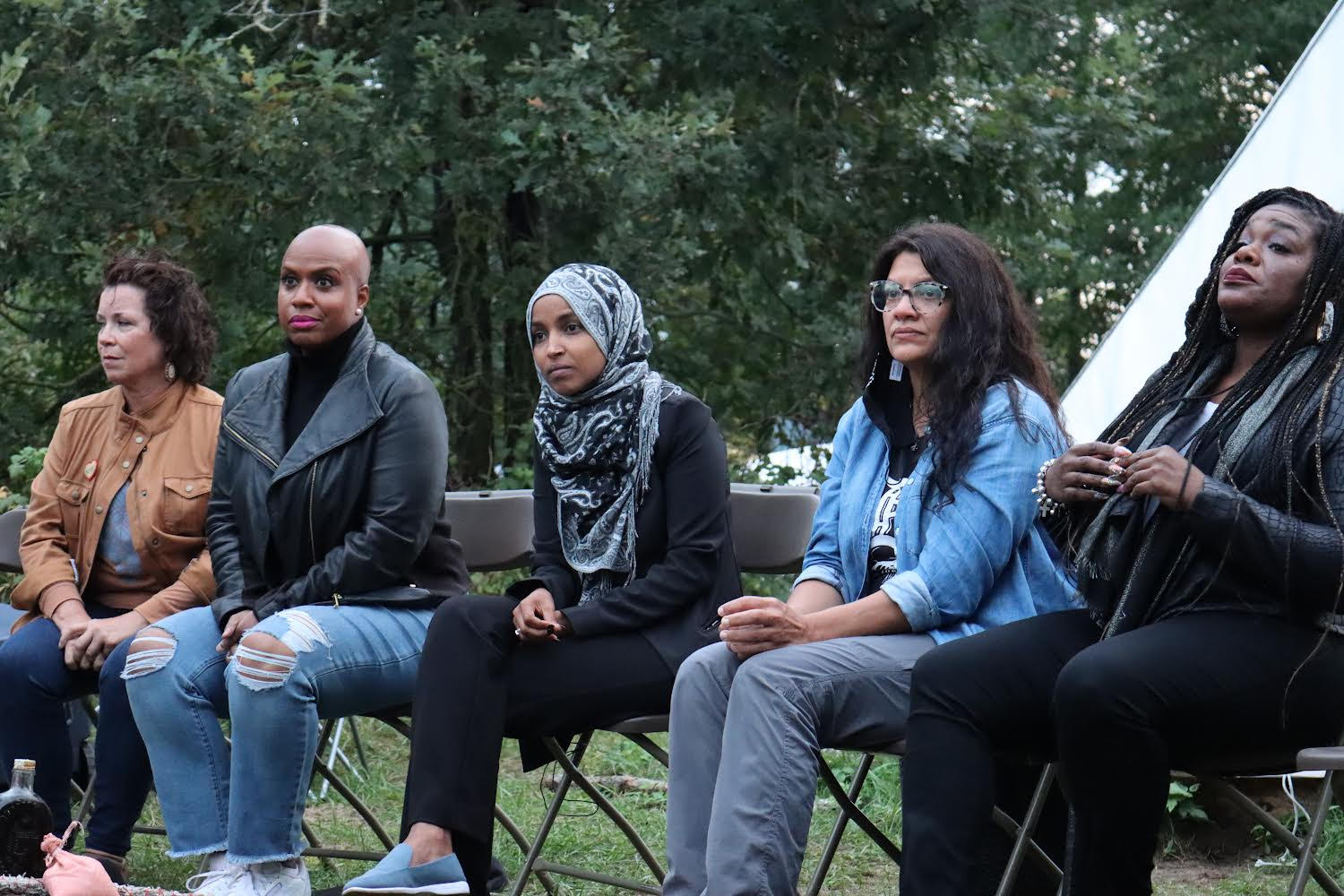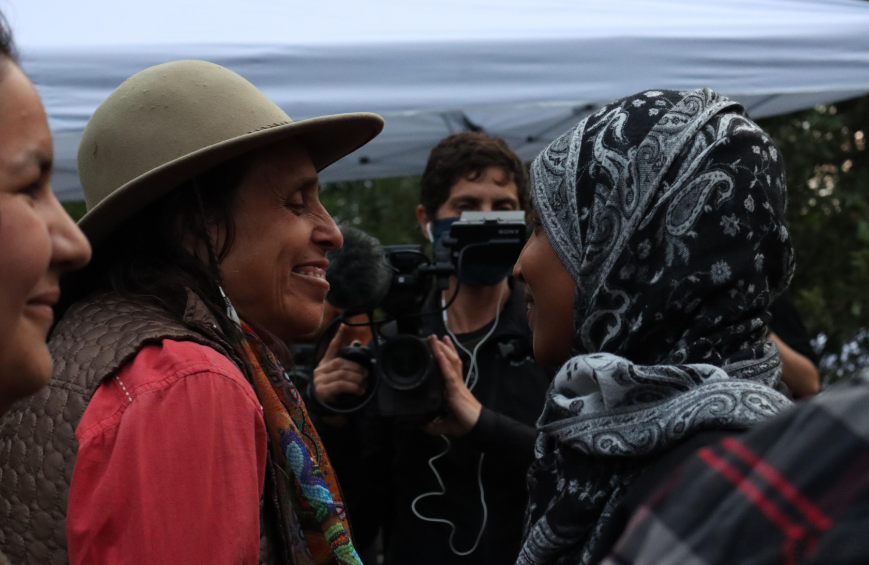
- Details
- By Darren Thompson
MENAHGA, Minn. — Late Friday afternoon, a contingency of U.S. lawmakers traveled to northern Minnesota to hear directly from Line 3 opponents at Camp Namewag, a resistance camp several miles south of Park Rapids. The contingency was led by Minnesota U.S. Representative Ilhan Omar and included U.S. Reps. Rashida Tlaib (D-MI), Cori Bush (D-MO), and Ayanna Pressley (D-MA), and Minnesota state Sen. Mary Kunesh.
The four Democratic congresswomen are collectively known as “The Squad” their colleagues in Congress. The group is well known for being progressive and was often targeted by former President Donald J. Trump.
Want more Native News? Get the free daily newsletter today.
“The climate crisis is here on Turtle Island,” said Giniw Collective Co-Founder Tara Houska as she welcomed the group of lawmakers to Camp Namewag, a Giniw Collective Line 3 resistance camp. “We are honored that you have come to meet with us as we discuss the destruction of Mother Earth.”
The visit was in response to an invitation for Rep. Omar by camp leadership to bring her colleagues from Washington to a Line 3 resistance camp. The contingency will also make visits to Bemidji and other parts of northern Minnesota this weekend to speak with members of Indigenous communities and others who have been protesting construction of the Line 3 pipeline. According to Enbridge, construction of Line 3 is more than 90 percent complete with anticipation of oil flowing through the pipeline by the end of the calendar year.
The visit by the Congresswomen is part of a final pitch to President Joe Biden to revoke the permits for the pipeline replacement project. On Monday, August 30, 2021, more than 60 members of the U.S. Congress wrote a letter addressed to President Biden asking him to project Indigenous sovereignty citing climate change, police brutality, and sex trafficking.

“We’ve almost been ran over a couple of times near Camp Firelight as we were practicing our treaty rights near the pipeline,” said 13-year old White Earth Tribal Member Silan Neeland to the Congresswomen. “The trauma continues, day by day, and I see police shoot our relatives for conducting ceremony.” Neeland’s testimony brought several Congresswomen to tears.
All law enforcement agencies in northern Minnesota are reimbursed by an escrow account paid for by Enbridge, but supporters of the pipeline cite that reimbursements are for salaries associated only with monitoring protest activity near construction sites. More than 900 people have been arrested or cited for demonstrating against Line 3 since construction began in December 2020. The total amount incurred by law enforcement agencies has surpassed $2 million.
“We’ve all been fighting this pipeline for 7 to 8 years,” said Honor the Earth Executive Director Winona LaDuke to the Congresswomen. “We really appreciate you all coming to hear from us, but we really need Biden to do something.” LaDuke has been arrested several times for opposing construction of Line 3 and faces multiple charges in multiple jurisdictions.
Rep. Ayanna Pressley thanked the participants in Friday evening’s meeting for hosting the delegation and allowing the members of Congress to learn from those who have been encamped in northern Minnesota. “Sadly, we are beneficiaries of the legacy of this country, which seeks to heal trauma with more trauma.”
“The violence and the violation of your sacred people must stop,” said Rep. Pressley to the group while in tears. “You are worthy of so much more.”
New York Representative Alexandria Ocasio-Cortez was anticipated to travel to northern Minnesota, but had to deal with a climate change emergency in her home state of New York while parts of the state are flooding from Hurricane Ida.
The visit to northern Minnesota comes the same day a group of Minnesota Republicans and union members gathered in the U.S. Capitol in support of the pipeline. “In northern Minnesota, the constituents I represent are happy this project is moving forward. Are happy about the economic benefits. Are happy about the vetting process,” Rep. Pete Stauber (R-Minn.) said to The Hill on Friday.
Valued at $3 billion, the Line 3 tar sands oil pipeline will be the largest tar sands oil pipeline in the world. Once completed it will transport 760,000 gallons of tar sands oil per day through pristine wetlands in northern Minnesota. If a spill were to occur, Indigenous leaders say it would destroy many wild rice beds, affecting Anishinaabe treaty rights in Minnesota. Opponents and Indigenous leaders say that a more thorough environmental impact statement (EIS) should be conducted.
The pipeline has already been replaced in Canada, North Dakota and Wisconsin and is aimed to restore the pipeline to its original capacity of 760,000 barrels a day. According to Enbridge, more than 20 federal, state and local permits and approvals were needed prior to construction, making Line 3 the most studied pipeline project in Minnesota history.
More Stories Like This
Native News Weekly (August 25, 2024): D.C. BriefsCadiz, Inc. Announces EPA Selection of Mojave Groundwater Bank Northern Pipeline Project for WIFIA Loan Application
Jesse Jackson, Who Bridged Civil Rights Struggles for Blacks and Native Americans, Dies at 84
SAVE THE DATE: GVSU’s “Celebrating All Walks of Life” Powwow Set for April 4th
Monday Morning: (February 16, 2026): Articles You May Have Missed This Past Weekend
Help us defend tribal sovereignty.
At Native News Online, our mission is rooted in telling the stories that strengthen sovereignty and uplift Indigenous voices — not just at year’s end, but every single day.
Because of your generosity last year, we were able to keep our reporters on the ground in tribal communities, at national gatherings and in the halls of Congress — covering the issues that matter most to Indian Country: sovereignty, culture, education, health and economic opportunity.
That support sustained us through a tough year in 2025. Now, as we look to the year ahead, we need your help right now to ensure warrior journalism remains strong — reporting that defends tribal sovereignty, amplifies Native truth, and holds power accountable.
 The stakes couldn't be higher. Your support keeps Native voices heard, Native stories told and Native sovereignty defended.
The stakes couldn't be higher. Your support keeps Native voices heard, Native stories told and Native sovereignty defended.
Stand with Warrior Journalism today.
Levi Rickert (Potawatomi), Editor & Publisher
